- I've been keeping hella-busy lately; this in itself wouldn't keep me from
posting, but it's keeping me from coming up with good ideas for posts. Sorry
about that, it's only temporary.
- I'm going on a business trip to China in a couple days. I hope to have
some pictures and stuff posted when I'm back.
- Easy Star All Stars -
Dub Side of the Moon is as listenable as it is funny.
- I've ditched Gaim, at least
until the next beta. Aside from being ugly, it's currently too quirky and
slow. Since I can't really stand Miranda the only viable alternative at
current is Trillian.
- I've had to reinstall my machine at work... experiences in a separate
post.
- ReSharper 2.0 is at version
#251, which supposedly fixes a lot of performance issues.
- Oren Eini's posting like mad, make
sure to finger his blog occasionally.
- I'm rennovating my home theater setup. Current candidate list: Panasonic
TH-42PHD8, Paradigm
Monitor 9 v4, Paradigm
CC-370, Denon
2601. Regardless, I would appreciate any pointers in the same price
class.
There are some extremely nonobvious repercussions to switching domains, a few
of which we were unfortunate enough to encounter here at Monfort.
The first of those is that certain source control providers (such as Vault) consider the host name an
integral part of a check out atom; since the domain name switch resulted in a
change in all host names, the direct result was that after the switch our
developers were unable to do anythign with files that had been checked out
before the switch. Although Vault is based off of SQL Server I couldn't figure
out how to "surgically" take care of the problem; changing the host record in
the check out object table had no apparent effect. I thought this might have to
do with client/server side caching, but restarting both did not have the
expected result. To save time, we eventually worked the problem out by undoing
all check outs server-side from the administration tool and manually checking
the files back out.
The second problem was much less obvious: some of our projects make use of
cryptographic key containers for signing .NET assemblies; after the switch we
started getting "8013141C errors" (Windows will not format this error message).
We tried reinstalling the key container only to get an "Object already exists"
message from the sn tool. Yaniv, one of my
colleagues, managed to find an article with the
apporpriate solution: apparently one needs to update the ACL on Documents and
Settings\AllUsers\ApplicationData\Microsoft\Crypto\RSA\MachineKeys.
Simple, but not trivial.
It's been a while since I've posted anything gaming-related, and I'll make it
short and sweet: stop whatever it is you're doing. Buy Dreamfall. Play it. Relish it. It would be
better if you played The Longest
Journey first, but it's not an absolute must (you'll enjoy the sequel a lot
more though).
Suffice to say that this game looks amazing, plays amazing, sounds amazing...
the voice acting is top-notch, the story and settings are magnificent. It's...
bloody awesome. Along with Psychonauts it must
be the best game I've played in years.
Quietly and (apparently) without fanfare, JetBrains have released ReSharper 2.0. Those of you used
to 1.5 will find that the new version is extremely feature-rich, but also
radically slower than 1.5; I seriously hope JetBrains are aggressively
optimizing their plug-in, because on large projects it can become quite
sluggish.
That said, the huge amount of new features as well as Visual Studio 2005
support are a definite reason to move to 2.0.
Damned if I know why, but Visual Studio
2005's debugger just stopped working today. I initially found this out when I
attempted to run PostXING in debug mode, and although the debugger seemed to be
working (VS2005 switched to debug view, the postxing.vshost.exe child process was right there)
absolutely nothing happened for minutes. When I eventually hit Shift+F5 I was
faced with another 30-odd-second stall, after which I was duly presented with
this astoundingly useless dialog:
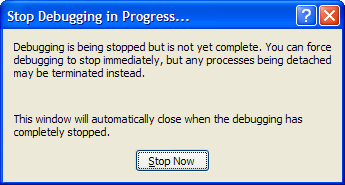
"Mom! The VS2005 debugger is being a
dildo!"
If I didn't want to stop the debugger, I
wouldn't have hit Shift+F5. This is a class case of the "I know what you want
but I'll ask you anyway" syndrome which is becoming increasingly evident in
Microsoft's newer products (such as Windows Vista).
But that's not the issue. I can't
get the damn debugger to work. It stopped suddenly and wouldn't debug
any project at all - it just hangs during or immediately after loading
symbol files. And I can't find anything about it on the 'net, either. Oddly
enough, attaching to external processes seems to work
fine. Ideas?
How closely coupled the various components in Windows are. Take Internet
Explorer, for instance; this wretched thing has been around since the days of
Windows 98, and is now so entrenched in the bowels of the operating system it's
impossible to get rid of. In fact, if you tried to remove it from your machine
you'll find that it's not even a relevant option:
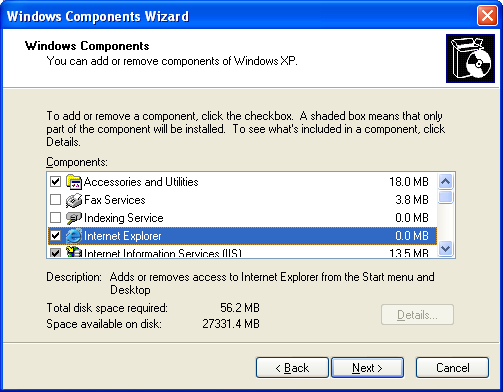
That might explain why I reacted with very little surprise when I encountered
the following dialog box when starting windows explorer (read: double-click on
"My Computer"):
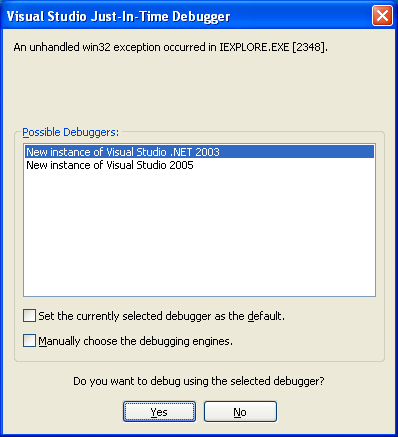
I didn't start the debugger, in case you were wondering. As much
as I appreciate people who actually bother attempting production-debugging on
other people's programs, I don't have the time and patience for this - I have
actual work to do (particularly when at work). So I selected No. And
the dialog came up again. And again. And again. To top it off, my CPU was
bottomed out; Process Explorer seemed to think MDM was the culprit:
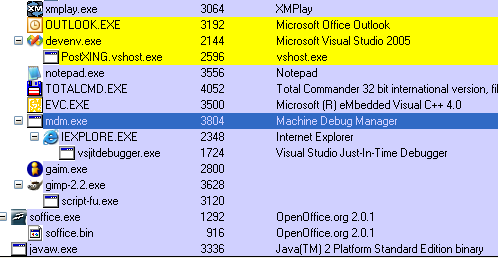
So now Internet Explorer and most programs that rely on it crash
immediately on startup (oddly enough, RSSOwl,
which relies on SWT, which relied on
Internet Explorer, works without a hitch). I immediately suspected some sort of
adware/malware/crapware, but Spybot wouldn't find anything. Now what am I
supposed to do? I hardly think Internet Explorer (which I hardly ever use
anyway) is worth a complete system reinstall.
Warning: Emotional outburst follows
So here I am, working on the latest and greatest version of Microsoft's
flagship messaging and collaboration application (read: the antiquated Outlook
2003 and its bug-riddled back-end). I've switched back to
Outlook after over a year of using the generally excellent Thunderbird. It's
driving me insane.
For starters, despite the fact that Microsoft has had years to
perfect the multilingual - bidirectional text, in particular - support
in its applications, Outlook still suffers from what - in a new product - would
be considered amusing issues that a hotfix will come out for in a couple of
days. Over three years after its release Outlook still manages to completely
mangle plain-text e-mails. Take a normal, Engilsh plain-text e-mail and try to
reply to it. At times (I still haven't been able to find a pattern), although
the e-mail is displayed just fine, replying to it causes the bidi heuristic
engine built into Outlook to decide that this is a right-to-left e-mail, and the
reply is prepared accordingly (quoted lines included). This wouldn't be such an
issue if there was any way at all to change the reading order
without completely mangling the text (Ctrl+A, Ctrl+Left Shift):
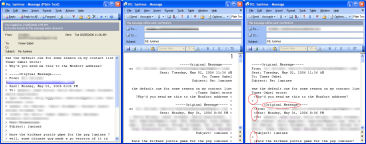
Original e-mail (left), Outlook's reply (center)
and after changing the reading order (right)
I showed this to Ilya (a friend and colleague with much experience
in bidi-related issues). His best idea was to write a macro to do the low-level
conversion for me. That's not really a solution; where bidi support in
Thunderbird is merely missing, in Outlook it's outright
broken. Thunderbird allows me to insert arbitrary HTML if I want to; in
Outlook there's simply no way at all to work around this problem.
To add insult to injury, I started using IMAP when working against
one of my mail servers. I was frustrated for a few days becaue the messages
marked as deleted were never actually removed from the server; aside from the
nuisance of seeing old messages displayed strikethrough along with fresh
messages (which can easily be filtered out), I simply could not figure out how
to purge the deleted messages. The most obvious option, "Process Marked
Headers", was completely useless; nor was "IMAP Folders..." of any help.
This has got to be the first time I ever actually used Office's help - a fact I
would normally attribute to a fundamentally impressive UI - only to find
that the option resides under "Edit->Purge Deleted Messages." Obscure
location? I thought so too. But at least the option is there.
Last month was full of interesting occasions and happenings for me - most of
those of an uninteresting, personal nature. It was hectic, to say the least.
Which is why my posts over the last month or so were extremely sporadic. I
intend to remedy the situation; now it's just a question of what to post about,
and this is where the problem lies: I am not familiar with my readership, such
as it is. Most of the comments I get in response to blogposts are either from
direct friends or occasional Google searchers; I appreciate these comments a
great deal, but they don't provide me with equally important information:
who are the people who consistently read this? What are the RSS subscribers
interested in? This is more or less a personal blog, which has its advantages
(freedom) and disadvantages (lack of focus), and I have no real way of
telling which of the subjects I touch gets more attention or interest.
This is where I'd really appreciate feedback! There are (presumably) reasons
why you read this blog. Is it for the development-related bits? Which posts do
you find useful/interesting, which are completely pointless? Please, help me to
keep you interested. Post a comment, e-mail me or whatever, and let
me know!
Wanting synchronization capabilities and frustrated with a bizarre folder
locking bug - a folder remains locked if a connection is dropped server-side
while downloading mail - which I was too lazy to fix, I switched from
Thunderbird back to Outlook 2003. It's actually a lot better than I remembered
(having worked with it extensively from a development point of view until last
year); when not working against an Exchange server (and on a gargantuan Athlon
64-based machine) it's actually very fast, doesn't stall and is pretty stable at
that.
It's not, all in all, a bad product. But it's not a complete one either.
First and foremost, Outlook's search capabilities are so
ridiculously bad that third party tools have been coming out for years to
address this shortcoming. Among those are Google Desktop Search, MSN Search Toolbar beta, Copernic
Desktop Search and very much my personal favourite, Lookout. Lookout is
an Outlook plugin written in .NET (one of the first commercial-grade products
I've ever seen to use the platform) which indexes your mail in the background
and performs extremely fast searches. It's complete free and was, in fact, so
good Microsoft bought the company a couple years ago and is presumably busy
incorporating Lookout's features into Outlook 12.
Second, the spam filtering options are lacking. I've no idea what sort of
mechanism Outlook uses, and it is effective for certain kinds of spam, but it
also generates a lot of false positives and misses a lot of other spam. Looking
for a client-side (i.e. non-proxy) bayesian filter implementation for Outlook I
eventually settled on SpamBayes,
which is so far completely stable and hassle-free - not to mention effective,
and open-source at that.
Moving back from Thunderbird was not without hassle though; I
wasn't inclined to import the Thunderbird mails over to Outlook so that wasn't
much of an issue, but I couldn't get the "Send To Mail Recipient" shell option
to work with Outlook. Theroetically, merely changing the default mail program in
"Internet Options->Programs" to Outlook should do the trick, but it appears
not to be the case. I eventually found a solution on Joel's
old forums: start RegEdit, go to HKCU\Software\Clients\Mail and change the default value
from "Mozilla Thunderbird" to "Outlook". That's all there is to it.
As a bottom line, if you do not require simple bidirectional mail support or
PDA synchronization via ActiveSync, stick to Thunderbird. It's a basically
superiour piece of software.
As part of an on-going research I've been playing around with Windows
Vista build 5342. Spoiler: it's not ready for prime-time, not even remotely.
Here's a quick run-down:
- Performance is aweful. On my reasonably powerful
development workstation (Athlon 64 3500+, 1GB RAM, Radeon X300) it literally
crawls, and feels closer to how Windows XP performs on my old Celeron
900-based server at home. Eating broken glass shards seems almost
preferable to browsing files on the Visual Studio 2005 DVD.
There
are also minor performance issues which may be related to immature drivers as
opposed to Vista itself, primarily to do with sound: practically any CPU
time-consuming operation on the OS side (such as when it changes screen mode
or performs sudden but serious disk I/O) results in sound stuttering.
- Eye-candy: Vista looks slick, have no doubt about it. The
new Aero is very appealing. I'm not a Mac afficcionado so I can't really tell
if it's been ripped off of Aqua or not, but strictly speaking I don't
actually care. Some aspects of the UI can definitely use some polish -
particularly the annoying tendency to reset the display whenever I switch to
one of the "secure" displays (i.e. login or ctrl+alt+del), but the window fade
and deformation effects are wicked, and the Glass feature (where window frames
look vaguely like glass and everything beneath them is blurred) are absolutely
gorgeous.
- Compatibility and stability is severely lacking. I'd
expect an OS that's been in production for years (not to
mention scheduled for a 2006 release, which was only recently postponed)
to be a lot more stable than this. Most applications work reasonably
well, but for example while Firefox installed perfectly it wouldn't work past
the first boot:
What's worse is that Firefox wouldn't even uninstall afterwards. That's not
generally a good sign. Visual Studio 2005 wouldn't install at all
(installation failed silently) and I couldn't find anything useful about it on
the 'net (just some comments regarding MSXML6, which was not the case here)
until I rebooted the machine. The .NET Compact Frameworks, J# Redistributable
and SQL Server 2005 would not install at all. Some applications would not even
start (the Total Commander installer, for instance), others would display
unusual error messages but work just fine afterwards:
Networking in particular was unstable; I've no idea where to get beta Vista
drivers and since everything was mostly working out of the box I wasn't
inclined to look, but the network driver for the onboard nForce adapter would
often simply stop working, claiming that there is no traffic on the network.
Only a reboot would remedy this.
-
Usability: In some respects, Windows Vista is a tremendous
improvement over Windows XP; it contains a huge amount of subtle but
helpful hints in dialog boxes, much quicker access to some aspects of the
OS configuration and a search function is available almost everywhere
(especially useful in the Start Menu). When it comes to security, though,
Vista is horrendously frustrating. Check out this post
by Paul Thurrott. A noted Microsoft fanboy, such harsh
cristicism coming from him gets double the attention. He is so
right: Vista will continuously pester you with annoying security
dialog boxes, and of particular annoyance is that this happens even if you are
an administrator! If Microsoft ever wants Windows to be taken seriously
security-wise, they should stop trying to stop malware from exploiting
administrative privilidges via ever more sophisticated techniques, and start
educating users not to use administrator accounts in the first place. This
malfeature, called User Account Protection (UAP), sends the wrong message. I
initially had the same reaction to Fedora Core 3, which would keep
asking me for administrator password, but I became accustomed to it quickly
because you don't usually DO things that require administrative priviledge as
a user. With Vista you can't do squat without getting a series of annoying
dialogs. For example, simply going to C:\Documents
and Settings results in this dialog:
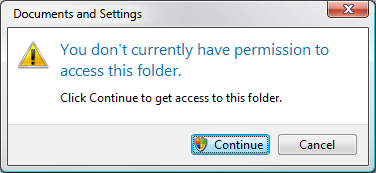 Clicking on Continue results in this dialog:
And finally, to add insult to injury, despite being an administrator I
can't seem to change ACLs on folders that reside on my own
machine:
Last but not least, having a look at the security settings for said folder
showed that nothing, in fact, was wrong and I shouldn't have any trouble
accessing it:
Additionally, there was some really weird usability bugs/issues. For
example, when I changed a folder's view settings to show hidden and system
files, this had some unexpected results, which you can see here:
Finally, I leave you with this jaw-dropping dialog I encountered on a file
copy operation:
-
Internet Explorer 7 is leaps and bounds beyond Internet
Explorer 6 in everything from performance to usability. Still, in the spirit
of frivolous security Microsoft has chosen to annoy the hell out of you with
brilliantly useless warnings that require user intervention, such as this:
I hope to update to the newer 5365 and re-test things, but currently this OS
seems so far from ready it's not even funny.
|